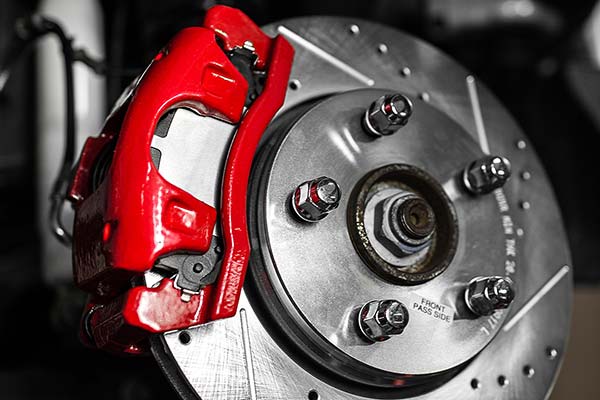In this article we are not going to tell you how to do advanced math on clamping forces, chemical makeup of different braking compounds, physics or any other such high level tech. What we are going to do is teach you the basics of braking systems and how to modify them without wasting a ton of $$$$$$.
The absolute fastest you can stop.
You could have 5 foot across 20 piston brakes and it wouldn’t change your stopping distance a lick.
You could gain 4000 lbs and stand on the brake pedal and it won’t do anything better than you have now.
Why? If you can lock up your tires, no amount of brake upgrades will do any good. In every braking system your tires are the point of limitation.
So what can you do
LOTS! On a modified Jeep with 12.5″ + wide tires you have increased the limiting point of the tires a LOT, so upgrading your brakes is definitely on the bucket list of things to do.
First lets cover the possible upgrades and what they will do for you overall.
Pad Compounds:
Compounds vary wildly, ceramic, semi metallic, carbon etc. A good set of high performance pads can have a very dramatic difference on your braking performance. And a lot of people mistakenly think all the gains they get from a Big Brake Kit (BBK) are all from the increased rotor size when its only part of the equation. (more on that later)
Depending on which pads you get they will dramatically increase or decrease:
- Initial bite (how grabby they are when you first touch the brakes).
- Fade resistance (how well they tolerate heat and still function)
- Dusting (how much mess they make)
- Longevity (how long they last)
Rotor Size:
No magic here. It’s all about leverage. The greater the diameter rotor, the greater mechanical advantage your brakes will have over your tires. Obviously the size is limited by what will fit inside your wheels.
Fancy Rotors (Drilled and Slotted): For a trail Jeep these are absolutely pointless. But the forums said!!! Allow us to dispel some rumor here. Cross Drilling is to help cool off the rotors faster under hard use. Slotting is to help sweep away particulate and off gassing created by the pad compound as you stop.
So why are they pointless? Ever see a race cars brakes? They will glow red after hard braking from 150mph, that’s when you need the slots to sweep away off gassing. And going corner to corner heavy on the brakes, thats when you need the cross drilling.
For an offroad vehicle those holes and slots get packed with mud, and pull contamination under the pads, and wear them out quicker (and unevenly). And you are never going fast enough to even make them useful. So don’t waste your money.
Calipers and Piston Count:
The more clamping force the faster you can stop. Good calipers tend to provide more force. Multiple pistons provide more even application of that force and more precise control over the brakes. Depending on what size tires you go with, you may want to make sure that BBK has larger or multi piston calipers to get the best performance out of your braking systems.
Stainless Brake Hoses:
Yes. Buy some. Now. They don’t flex like rubber hoses under pressure, and last for dang near ever. Plus if you lifted your Jeep or 4×4 they will need to be changed anyway to be the correct length.
Other Heat Management:
Something often overlooked is what type of wheels you run. A closed face wheel with very heavy spokes will tend to make your brakes run very hot due to reduced external air flow. The more heat, the more your brakes fade with heavy use.
Fluid Types:
The main differences between high end and cheap-o fluids is their Dry Boiling Point. What is this? The temperature that your fluid will boil inside the caliper and your lines. Obviously this is bad and can be a safety issue. In this case the good stuff is not that much more expensive than the bad. So we sell and use Redline RL-600 for just about everything. Want to read why? Visit Redlines Page ==> HERE
Other thoughts:
Most caliper and brake systems failures are because no one maintained the fluid. Brake fluid is Hydroscopic, meaning it absorbs water out of the atmosphere. If you don’t change it often enough, it will rust your lines and calipers from the inside out. You can buy a brake fluid tester off Amazon for cheap (Brake Fluid Tester) and test, or just go by the rule to change it every 30,000 miles.
